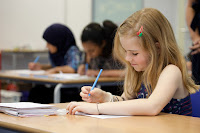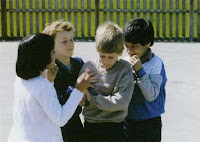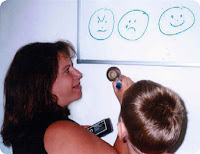How to Approach Children with Aspergers: Advice for Parents, Teachers and Peers

How should people without Aspergers approach/treat people with Aspergers? Advice for Parents and Teachers— Aspergers (high functioning autism) describes individuals who show difficulties in interpersonal communication. They've problems in recognizing and using social cues, and thus tend to be awkward or inappropriate in social relationships. Consequently, they frequently come across as rude or obnoxious or insensitive. They also are apt to have unusual hobbies and behaviors. Generally they may have strong interests about particular subjects that border on being compulsive. One picture of Asperser type tendencies may be the peculiarly British hobby of train spotting. This involves standing for long periods of time in train stations, taking notes of the serial numbers of passing trains, with the aim of "spotting" every train available. You can even find books published listing rows and rows of train numbers! Asperser kids also have very firm ideas of rig




